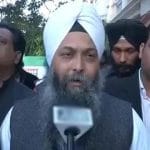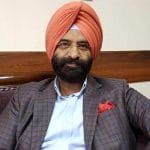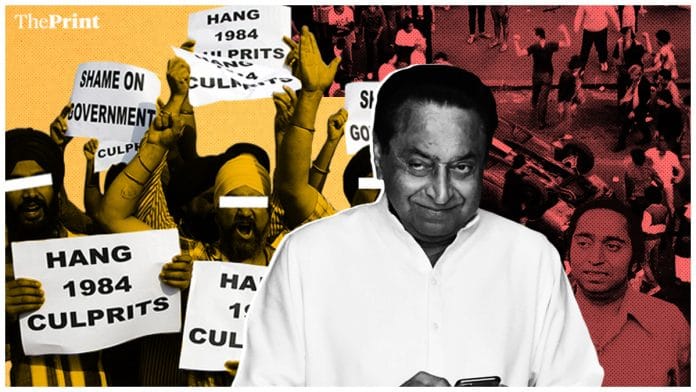The Home Ministry has ordered the reopening of seven 1984 anti-Sikh riots cases, including one against Madhya Pradesh Chief Minister Kamal Nath for allegedly inciting a mob at Delhi’s Rakab Ganj Gurdwara after Indira Gandhi’s assassination in 1984. All these cases were filed at various police stations in Delhi and were earlier closed due to lack of evidence.
ThePrint asks: Kamal Nath’s ‘role’ in 1984 riots: Has politics helped or hurt victims’ families?
Rajiv Gandhi & Narasimha Rao politicised 1984 riots. Reopening of cases by Modi govt also part of politics
 Jarnail Singh
Jarnail Singh
Author of I Accuse – The Anti-Sikh Violence of 1984
The anti-Sikh riots of 1984 has always been politicised, first by Rajiv Gandhi and then by P.V Narasimha Rao. This is the sad truth that one cannot escape.
Regarding Congress leader and Madhya Pradesh chief minister Kamal Nath’s role in the riots, there is proof that he was present at the Rakab Ganj Gurdwara in Delhi. Mukhtiar Singh, one of the two prime witnesses in the case, had even filed an affidavit. The gurdwara was one of the sites of the 1984 riots and was hit by bullets fired by the police. The Indian Express journalist Sanjay Suri reported on this and also on Kamal Nath’s alleged role. Even the Nanavati Commission expressed that the Congress leader had failed to explain his presence at the site.
About the seven cases that have been reopened now, one must remember that there is politics behind this as well. Under the Narendra Modi government, the Special Investigation Team under Pramod Asthana had initially shut 199 cases related to the riots. And while I welcome this move of reopening the seven case, why did the SIT not reopen all the cases? Earlier this year, RSS ideologue Nanaji Deshmukh, who indirectly justified the 1984 riots, was conferred with Bharat Ratna. So, it is evident that this is all politics.
Justice to victims and their families should only be a law and order issue. It takes a lot of will and determination to rise above politics and stand for justice.
Also read: How Modi’s 1984 riots attack on Congress could be turning point for BJP-SAD poll campaign
Kamal Nath instigated violence in 1984. Those indicted will talk about politics and politicisation
 Manjinder S Sirsa
Manjinder S Sirsa
MLA and national spokesperson, Shiromani Akali Dal
Politicising the 1984 anti-Sikh riots definitely hurts the families of the victims but there is no denying that Kamal Nath had a role in them. In fact, he instigated the violence. Talking about his role is not politicising the issue, as is being claimed; it is done to seek justice for the families.
To say that the issue is being politicised is taking the easy way out. The reality is that these cases were wrongly shut because the accused were discharged on the ground that there was no evidence against them. But the truth is that there is sufficient evidence. After I approached the Ministry of Home Affairs in 2018, the SIT passed an order in April this year, reopening the cases that had been shut.
Apart from the seven cases that have now been reopened, we can expect more such cases to come to light in the near future.
Those indicted in the 1984 riots will talk about politics and politicisation, but in a country like India, elections take place every once in a while. If the cases were reopened before the 2019 Lok Sabha elections, one could say it was a campaign strategy.
The question that we must ask ourselves is if we should stop our pursuit of justice for the fear of being accused of politicising the issue.
Also read: Why it took 34 years to convict Sajjan Kumar in 1984 riots case
Congress has tried to put some balm on the wounds of riot victims and granted compensation
 Jaiveer Shergill
Jaiveer Shergill
Supreme Court lawyer and national spokesperson, Congress
The Indian National Congress has always stood for justice for the victims of 1984 riots. We have never interfered legally in any manner in any of the proceedings, compared to the current dispensation. The Congress party has also tried to put some balm on the wounds of the victims and granted compensation and not shielded any of its members from any legal proceedings. Manmohan Singh and Sonia Gandhi have also apologised for the 1984 riots.
On the contrary, the BJP to date has neither provided any explanation nor apologised for the inclusion of 49 BJP-RSS members in 14 FIRs related to the 1984 riots. Therefore, the Akali Dal and the BJP should shun their hypocrisy and first own up to the active role the RSS played in the riots.
Post the 1984 riots, the Congress party has formed the government in Punjab on numerous occasions, including the current government led by Captain Amarinder Singh. And has even had a Sikh Prime Minister heading the Congress government. These are living testimonies of the fact that people of India are not falling into the trap of the false propaganda spewed by the BJP and the Akali Dal. If any case is going to be re-opened, the BJP should first provide an explanation for the involvement of 49 of its and RSS members in the 1984 anti-Sikh riots.
Victims of 1984 riots have been running from pillar to post for justice but no govt has done enough
 Jaswinder Singh
Jaswinder Singh
Chairman, 1984 Sikh Massacre Affected Welfare Society
The reopening of seven cases related to the 1984 riots is very important because what happened in the past was wrong. I believe this will help in our pursuit of justice. I do not know the motive behind reopening these cases — whether it is to serve political interests or deliver justice to the victims whose families have been running from pillar to post — but I am nevertheless hopeful.
The Supreme Court had been speaking about providing relief and rehabilitation to the victims and their families. The government did introduce a scheme in 1993 to provide bank loans to victims’ families at 1 per cent interest but the scheme lapsed in 1998, benefitting only a few people. We have been running from one ministry to another in search of justice.
The RSS has been of great help in reaching out to the government and supporting us but the government has never cared to respond to our letters or help us out. Our quest for justice has got lost as the government is preoccupied with everyday political events.
We did not expect justice from the Congress-led governments but had high hopes from the Narendra Modi-led BJP government. Unfortunately, even the Modi government has not done enough for us in the last five years. However, I am glad that these cases are being re-opened because now at least there will be a sense of fear in the perpetrators of the 1984 riots.
Politics never helps victims because it only provides limited justice

Geeta Luthra
Senior advocate
Politics never helps victims in the long run. They might feel assuaged by the fact that something is being done to provide justice to them, but that only acts as a mirage.
The cases that have been reopened in relation to the 1984 riots are criminal cases of cognisable offences. These, according to our criminal justice system, are essentially offences against the State. No one should be able to make a case against another person out of vendetta or enmity or vindictiveness.
The reopening of these cases can either lead to victimisation of those persons on whom a shadow of doubt was cast in the 1984 riots but were given the benefit of doubt by the Nanavati Commission, or it may result in violation of principles similar to double jeopardy (although these people have not been put through a trial). Permitting victims to have a larger role may result in better prosecution of the trial. However, in most criminal cases, the State should play a bigger role in securing justice to the victims than the complainant.
These cases being reopened 35 years after the riots do not serve any purpose because defending an accused becomes extremely difficult as the years pass and important evidence and alibis disappear. Which is why there is a statute of limitations in most cases. Moreover, in Kamal Nath’s case, the Nanavati Commission gave him the benefit of doubt. So, the twin factors of the benefit of doubt by a retired Supreme Court judge heading a commission of enquiry and the possible lack of availability of defence should not come in the way of the right to a fair trial while reopening the seven cases.
Politics or public opinion should never come in the way of delivering justice.
By Revathi Krishnan, journalist at ThePrint







It is one of the failures of our criminal justice system that closure can sometimes prove elusive for decades. Consider the Bhopal gas tragedy. However, while bowing one’s head respectfully to the families of the anti Sikh violence victims, unclear what this reopening of old cases will lead to in practical terms. It seems to be driven by politics more than a quest for justice. 2. The Editor once said that a few days after the 1984 violence ceased, when he met senior civil and police officials, there was a sense of shame, remorse, contrition. Many, including LG P G Gavai, were shunted out. We are becoming more coarse now.